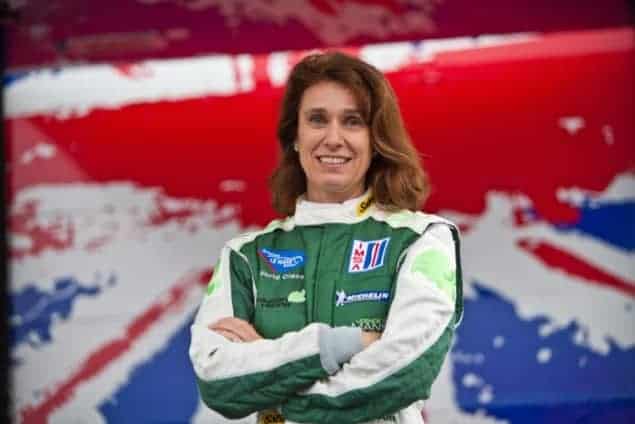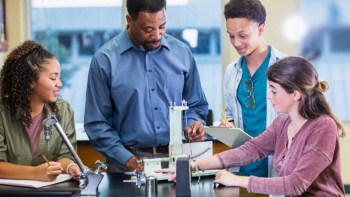Elspeth Drayson is co-owner and administrator of Drayson Racing, a Le Mans Series motor-racing team. One of the team’s drivers is her husband and business partner Paul Drayson, who is also the UK government minister for science and innovation. Here she talks to Margaret Harris about her route from physics to the pit-lane.

What sparked your interest in physics?
At school, my best subjects were maths and sciences, and while I was doing my degree at Imperial College London I particularly enjoyed classes in medical physics. This was partly because my father ran the medical-engineering department at Oxford University, so I had been exposed to the subject as an early age. My five sisters also studied science, so it was definitely in the blood. While I was then doing my MSc in medical physics and electronics at Bart’s Hospital, I became interested in the business side, so after finishing the MSc I did a degree in management studies at Oxford.
What did you do next?
I joined a small start-up company that was working on a system that monitored platelets prior to blood transfusion, to assess their viability. Platelets have to be stored at room temperature, not frozen, and they only last about five to seven days. At the end of their life they change from a disc shape to a sphere, and the idea was that we could measure their shape by shining light through them. The machine the company built to do this turned out to be an expensive solution, but it was a very interesting field, and I got quite involved in the marketing side. Then after I met my husband – which happened, literally, over a Bunsen burner in a lab at Oxford – we co-founded a vaccine company, PowderJect Pharmaceuticals, and developed it over a 10-year period.
How did you become involved in motor racing?
Paul went into politics after we sold PowderJect in 2003, and by that time I had already stepped down from being a director to have a family. But we had really enjoyed working together and we wanted to do something else. When he announced that he had always wanted to drive a racing car, I thought this was obviously a midlife crisis of some description. Then, after he had entered several races and started doing quite well, I recognized that it was not a temporary interest and if the children and I did not get involved, then we would hardly see him. We set up our own race team two years ago, and owing to Paul’s political commitments, I have been the one running it. My current role does not involve a lot of physics, but it does involve understanding the engineering decisions and the financial side of the business. I also love numbers, so at races I find myself concentrating on lap times and average fuel consumption. Having a numerical mind is really useful.
What are you working on now?
In this year’s American Le Mans Series, we are racing in the prototype category for the first time. One of the reasons we moved into this category is that you have much more scope to showcase new technologies. We did use biofuel made from waste wood in our previous car, but otherwise the rules really limit what you can do. With the prototype, we are looking at a whole range of things, from carbon capture to electric motors and flywheels, which may aid performance but will also be more energy efficient. One of the key reasons we got into racing was to show that you can combine green technology with a very fast race car. Also, race technology develops very quickly, so if innovations work and have applications in other areas, they can be on a fast track to integration.
Do you worry about safety when your husband is driving?
If you are just watching the cars, oddly enough it is easy to forget who is inside them. Even when you see a crash on the big screen, you just think “Oh, I hope that person’s okay”. But also the technology has improved tremendously. Back in the old days, when people had a crash at high speeds, they would break their neck from the sheer impact. Now, there is a device that attaches the helmet to the seat so that drivers’ heads are supported. That has saved many lives, and there are also fire-retardant race suits and so on. Having better technology still does not prevent all accidents; in fact, last year at Le Mans, the cars had a tendency to take off on a certain part of the track. They are like aeroplanes at that speed – not enough down force! Quite a few competitors were taking off, spinning, with parts of the car coming flying off – and then the driver would get out and walk off the track saying “I’m fine”. That reassures me that safety is pretty good.
Physics and motor racing are both very male-dominated – have you experienced any problems in either field?
At Imperial I was one of 20 women out of 200 students in my year, and at a careers evening I asked a medical physicist for advice. He said, “My advice to you – dear – is to find yourself a nice husband and not bother.” I was not disrupted by this, thankfully! There are even fewer women in motor racing than there are in physics; in fact, for a long time the only women associated with the sport were glamour models posing on the cars. But now there are a number of very good female engineers and mechanics who are not decoration – they make a contribution and excel at their jobs. I would like to think that in the future, any woman studying physics or engineering could think “Ah, perhaps a career in motor sport is for me”.
How do you think your physics background has helped you?
I think the training in physics makes you an analytical person, someone who is very precise and direct and who expects direct answers. This means you can spot people who do not know what they are talking about, even if they try to use technical language. Also, you can ask a couple of questions and soon ascertain exactly what is wrong. For example, during a race I listen to a lot of dialogue between engineers and drivers, so when someone reports smoke in the cockpit, noises or understeer, I can hear the solutions to the problems, and I know to ask about spare parts, why something was not tightened or tested, and so on.
Do you have any advice for physics students?
Pursue things that you are interested in, and dare to be different. A lot of people view science graduates as having limited options – teaching, research or finance – but it is possible to become an entrepreneur, and do something completely different that you never thought you could do. If you had asked me at aged 18 where I would be all these years later, I could never have painted the picture that now describes my life. I never thought it would be possible to have a business, a family that balances with challenging work, and the freedom to make choices without being constrained by a large institution. I really enjoyed studying physics, but I also enjoy doing things that are not necessarily related but where the physics training has been really useful.


